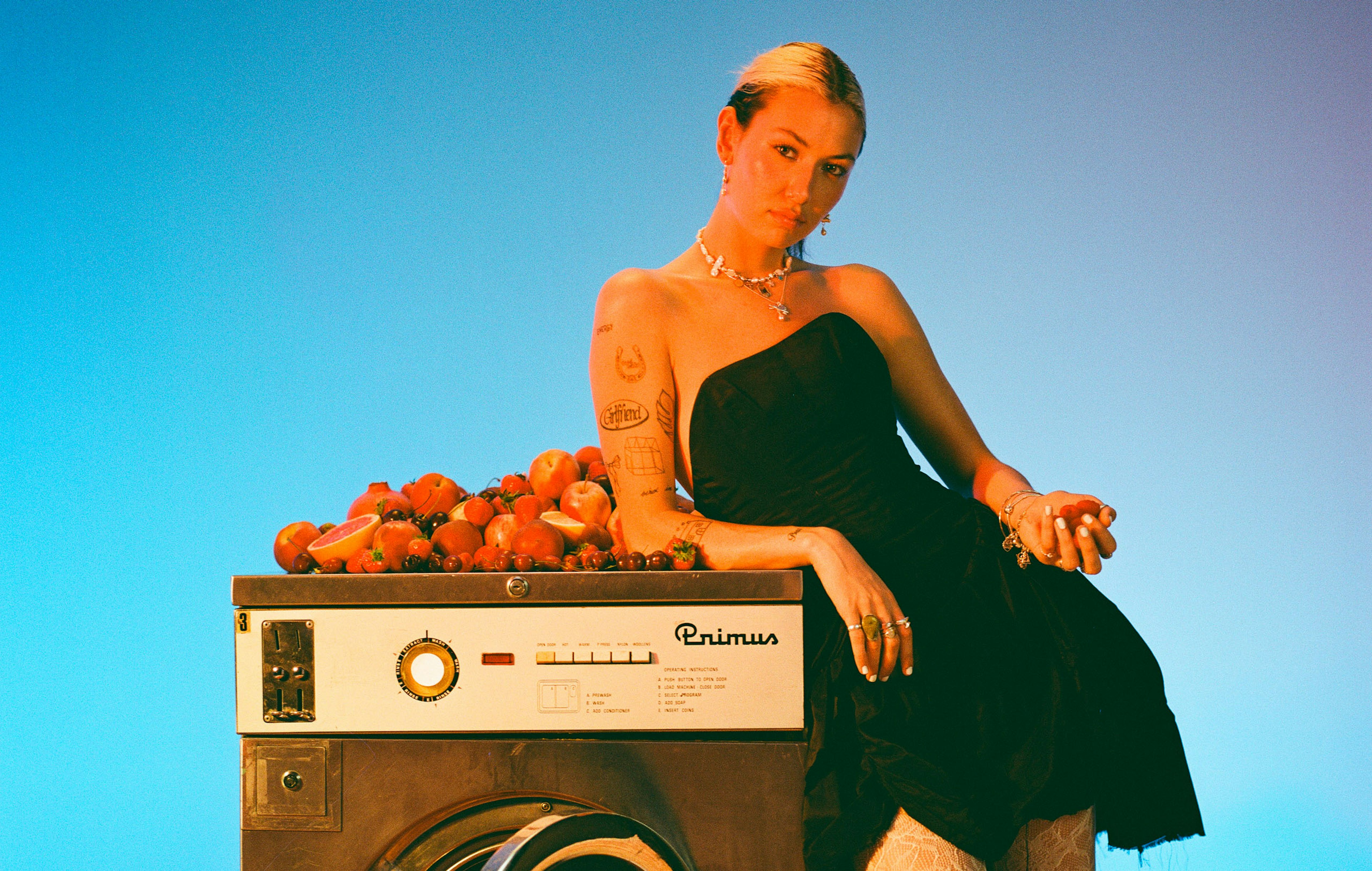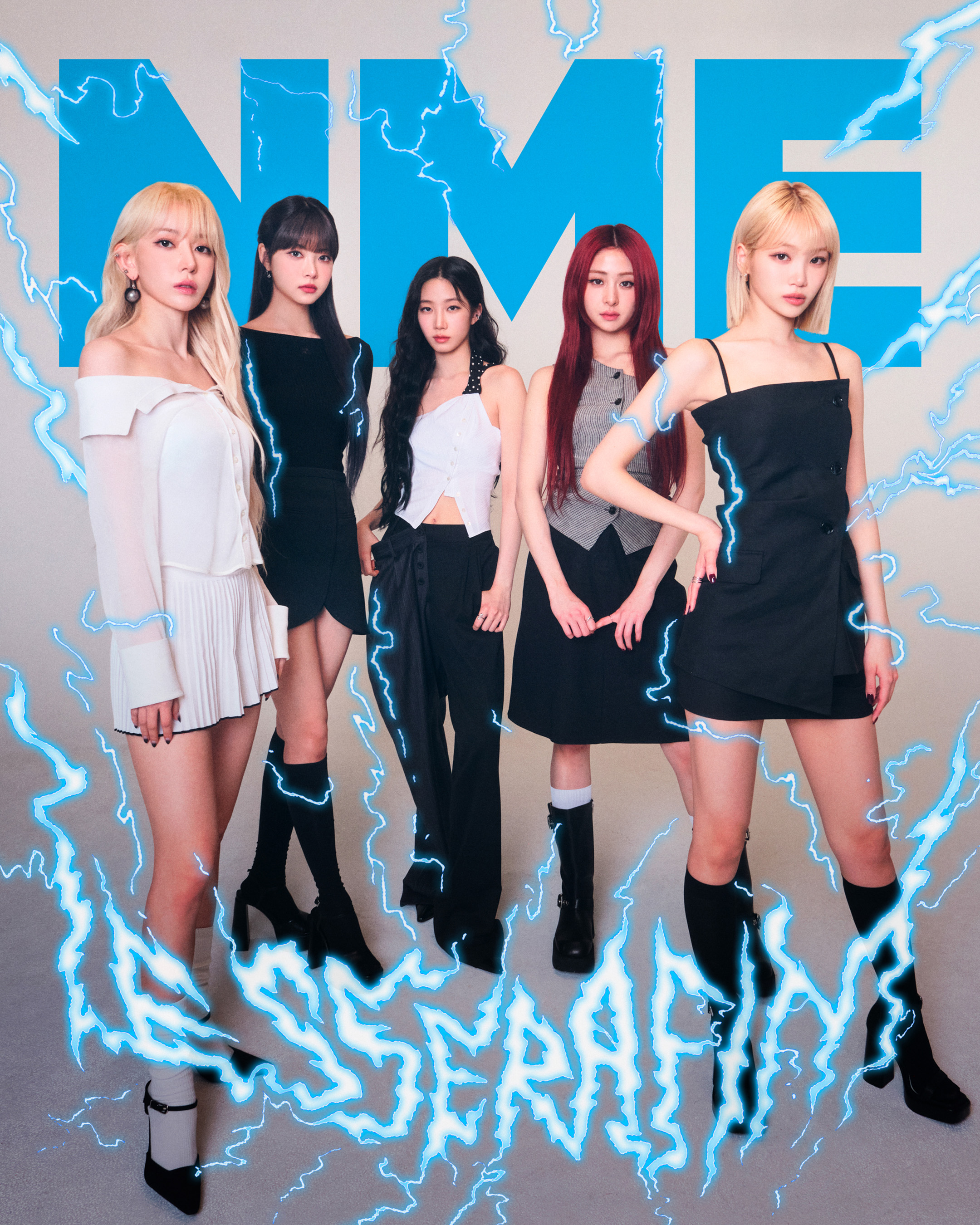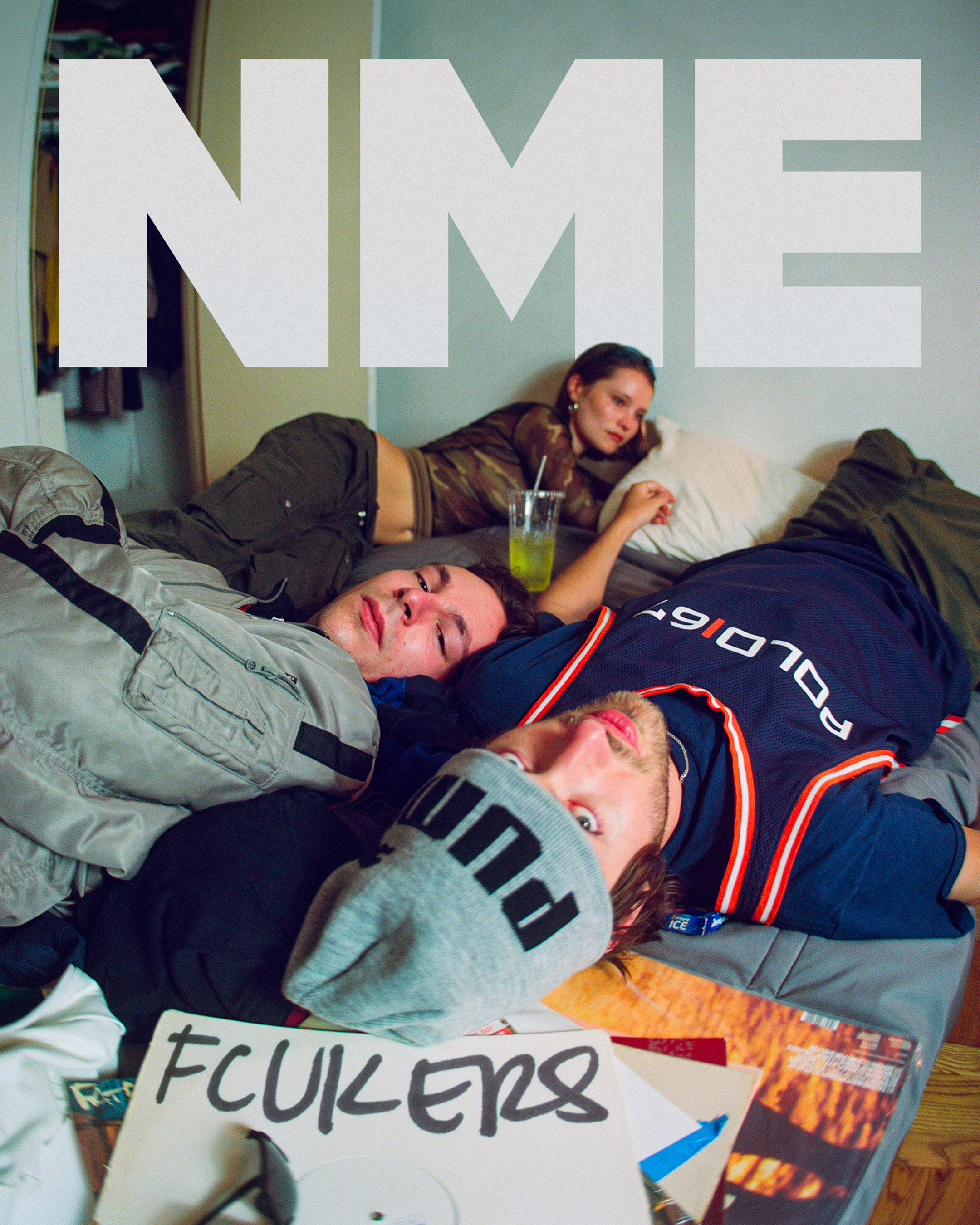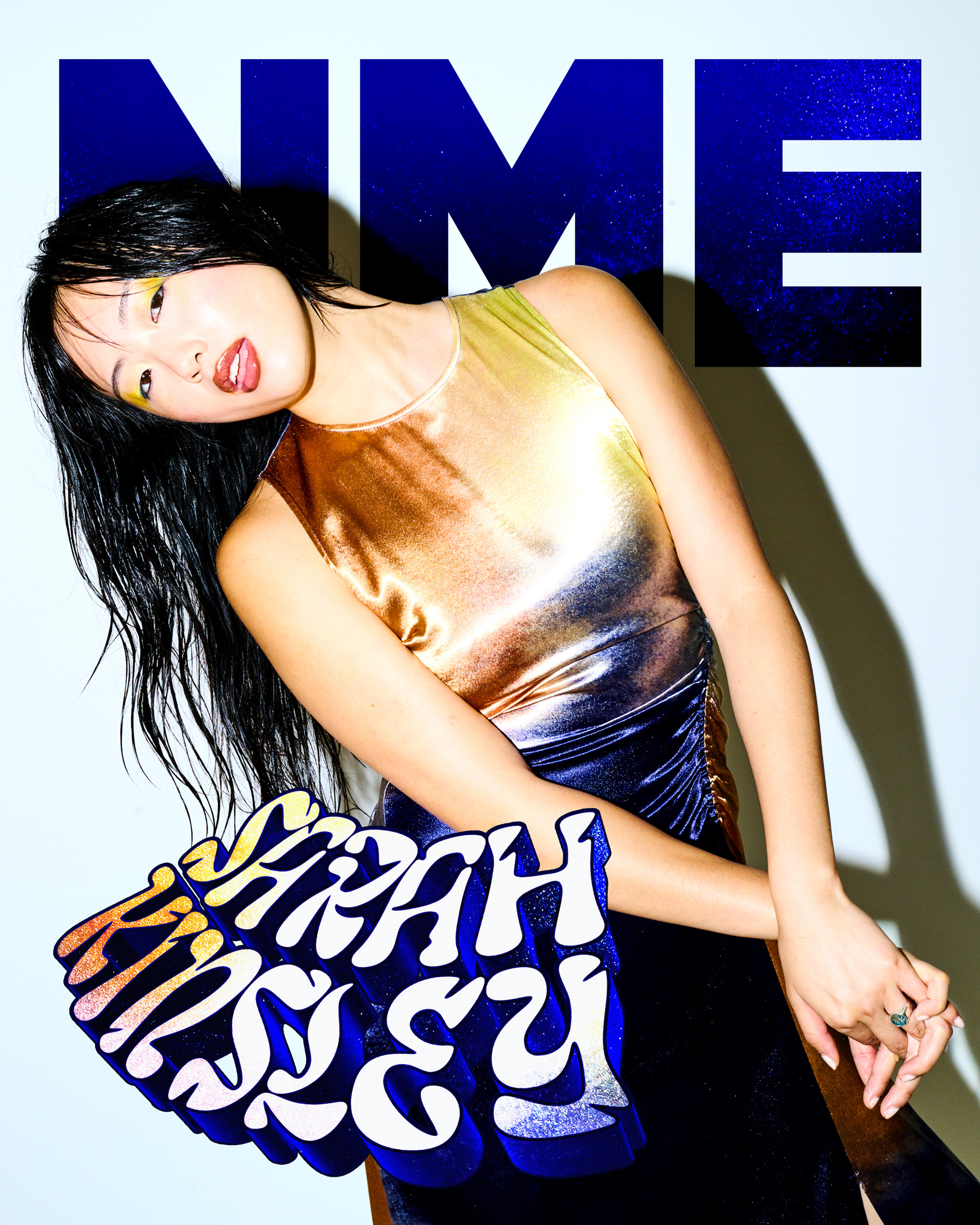Hidden behind a faux telephone box in guitar manufacturer Gibson’s London office is a private bar – a Narnia-esque hideaway where Nieve Ella is taking a brief moment of respite. NME meets the musician born Nieve Ella Pickering amid a 19-date festival run, which will be immediately followed by a six-week tour with Girl In Red. There, she’ll play Wembley’s OVO Arena – ticking off a major bucket list goal at 21 years old.
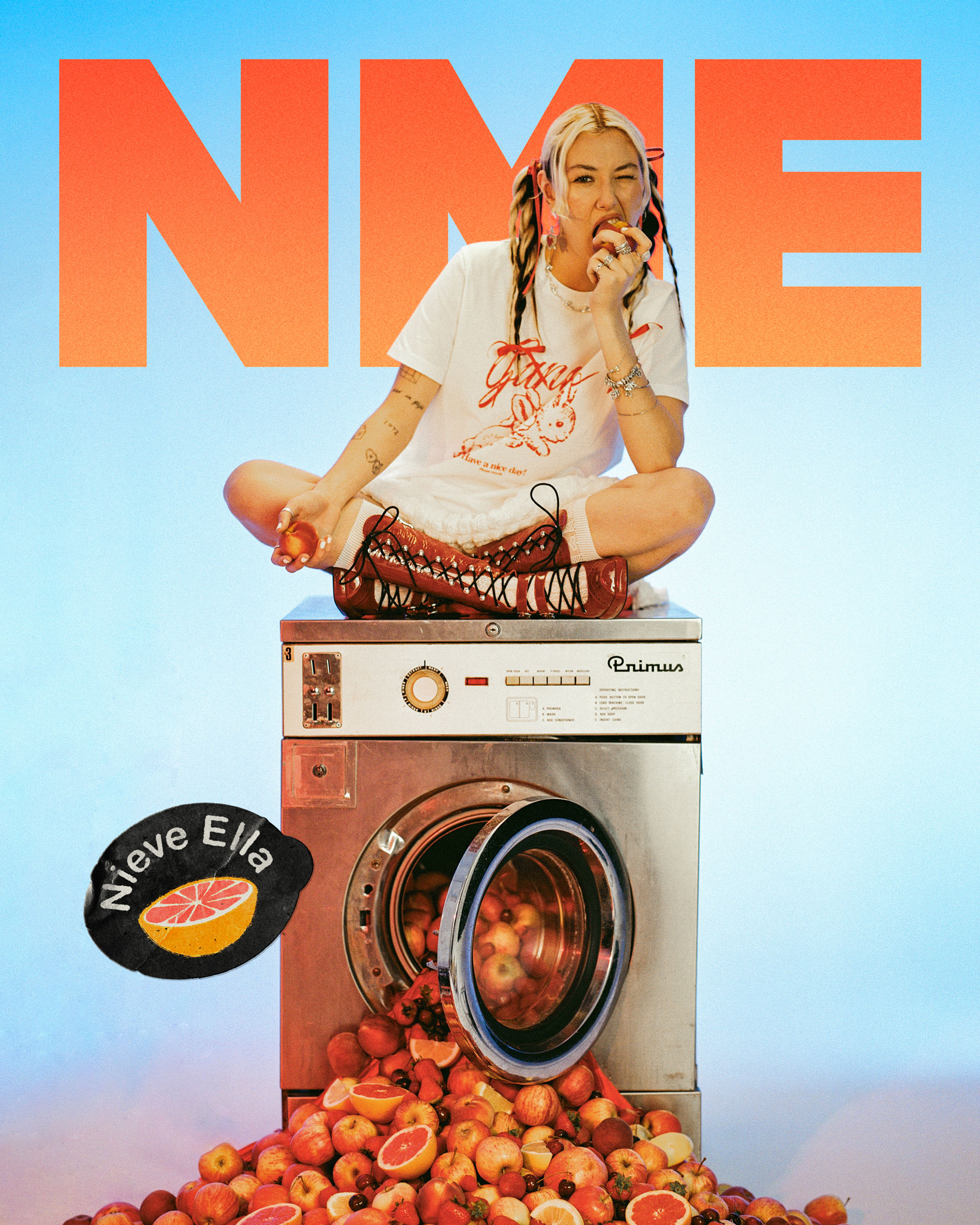
Lounging on a distressed brown leather sofa, Pickering seems at ease in stillness. She’s given away only by a suitcase lying in the corner, slightly battered from the almost daily trips away from her home, a tiny village in Shropshire.
“It’s so weird going back and forth,” she says, widening her eyes. “There’s nothing at all to do with music at home. I mean, there’s nothing like bloody this.” She gestures to the purple walls around her, laden with shining guitars.
She’s planning to make London her permanent home this year, but the finality of the move weighs on Pickering, who is ambitious but hesitant to close the door on her childhood. It’s a theme that’s imbued much of her music to date – most of which was written on the bedroom floor that now exists solely as a crash pad between trips to the capital.
“My room is my sacred place; that’s where I’ve become who I am,” she says, pensively tracing one of the many silver chains hanging from her neck. Though Pickering’s bedroom clutter may be slightly more glamorous than her peers – it’s littered with guitars and outfits from her recent European tour with Irish rock band Inhaler – this seems to be a sentiment shared among a generation who came of age during lockdown.
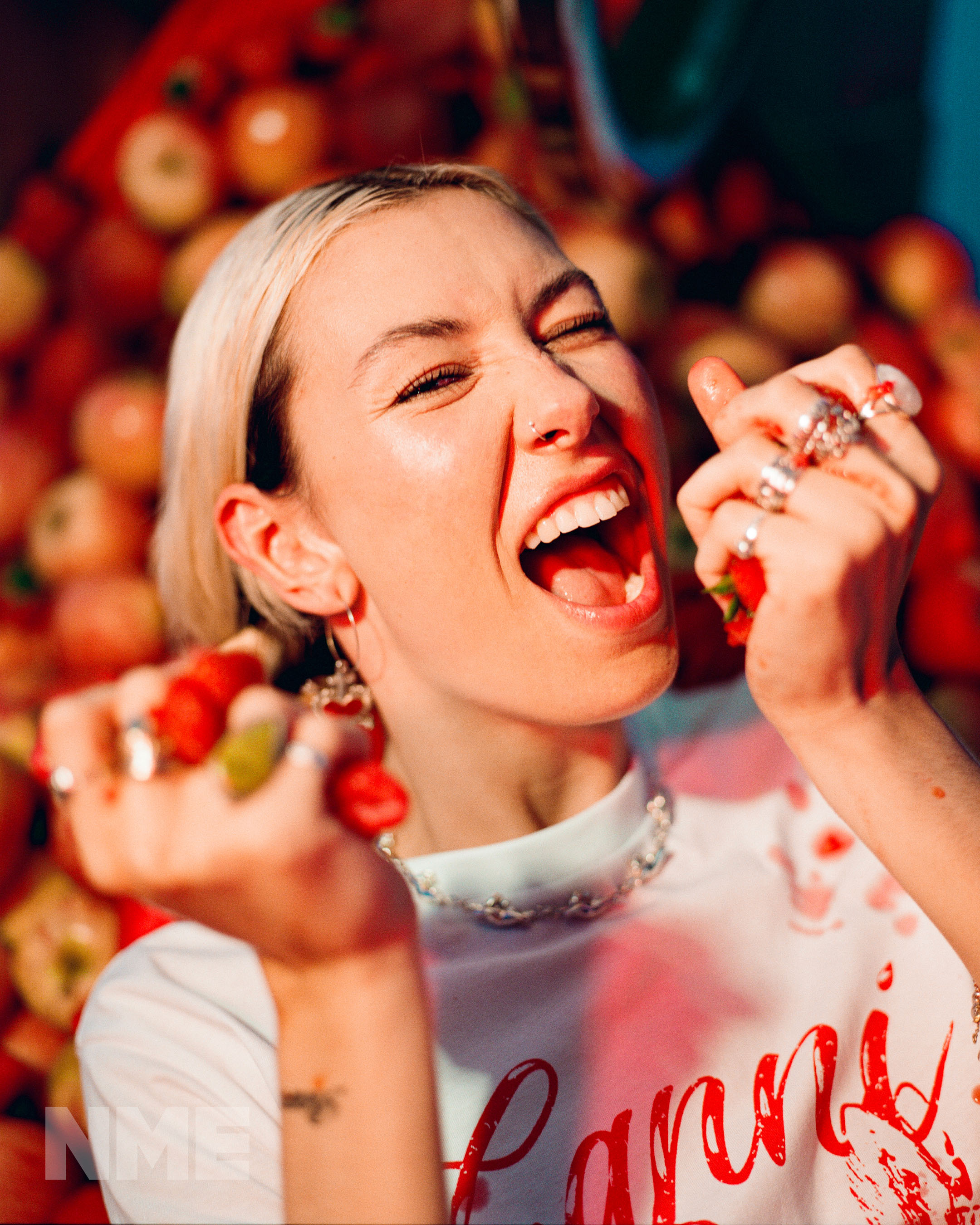
In this way, Pickering’s music tells the story of British suburbia and its fleeting encounters with the culture brewing in the cities just out of reach. Her debut EP ‘Young & Naive’ encapsulated the frustration of existing within a society that eschews the needs of young people – evident in their lack of representation in recent election debates. Through a string of pop-inflected, indie-rock singles so far, she’s chronicled the feeling of wanting everything but having nothing, obsessing over pop stars (‘Blu Shirt Boy’ is written about Harry Styles) and daring to dream larger than the confines of rural England.
Even her introduction to music, via the X Factor’s gleaming portrayals of the industry, was informed by an upbringing on the outside. She recalls Alexandra Burke’s winner’s montage as a core memory: “I was so obsessed with the fact that she was a normal person, and then all of a sudden, she became this star. I was just so infatuated with the fact that that could happen.”
But it wasn’t until lockdown, when she picked up a guitar that had belonged to her late father for the first time, that she began to take music seriously. “The songs came out of me and then just didn’t stop,” she smiles.
In line with others whose musical careers were born in the pandemic, she later amassed a fanbase on TikTok. But though Pickering, born in 2003, is a digital native, it’s the hand of live music that’s guided her career.
“That’s always my thing: I want people to feel supported by my music”
One day, while on shift in her mum’s shop, she heard via the soft hum of the local radio that Sam Fender was performing in Birmingham that night. She left work early and convinced her friend to trek into the city with her, hoping to gain access to the sold-out gig. In the queue, they happened upon a man giving up his ticket, and then, at the box office, they managed to score another – the last one left. “It was already fate,” Pickering smiles. “And then, this guy that I really fancied at the time appeared.”
They ended up dancing with him and his friend all night at a gig she likens to a spiritual experience. The friend is now her touring drummer, and the guy ended up as the muse for her first EP. “I fully believe that whole day was supposed to happen. Even though he wasn’t the greatest and I’ve written pretty harsh songs about him,” she grins. “I wouldn’t be sitting here if it wasn’t for that day.”
Fender’s music, unsurprisingly, holds sentimental value for Pickering. It manifests in the shades of British indie rock that have moulded her sound – notably a scene that’s excluded women for decades.
The genre has evolved, but for Pickering, getting beyond the barrier has been an uphill battle. She recalls one early experience with an older male producer: “I came in wanting to write a rock song and he was like ‘Nah, that’s not you. You aren’t good for that. You need to write girly pop music’.”
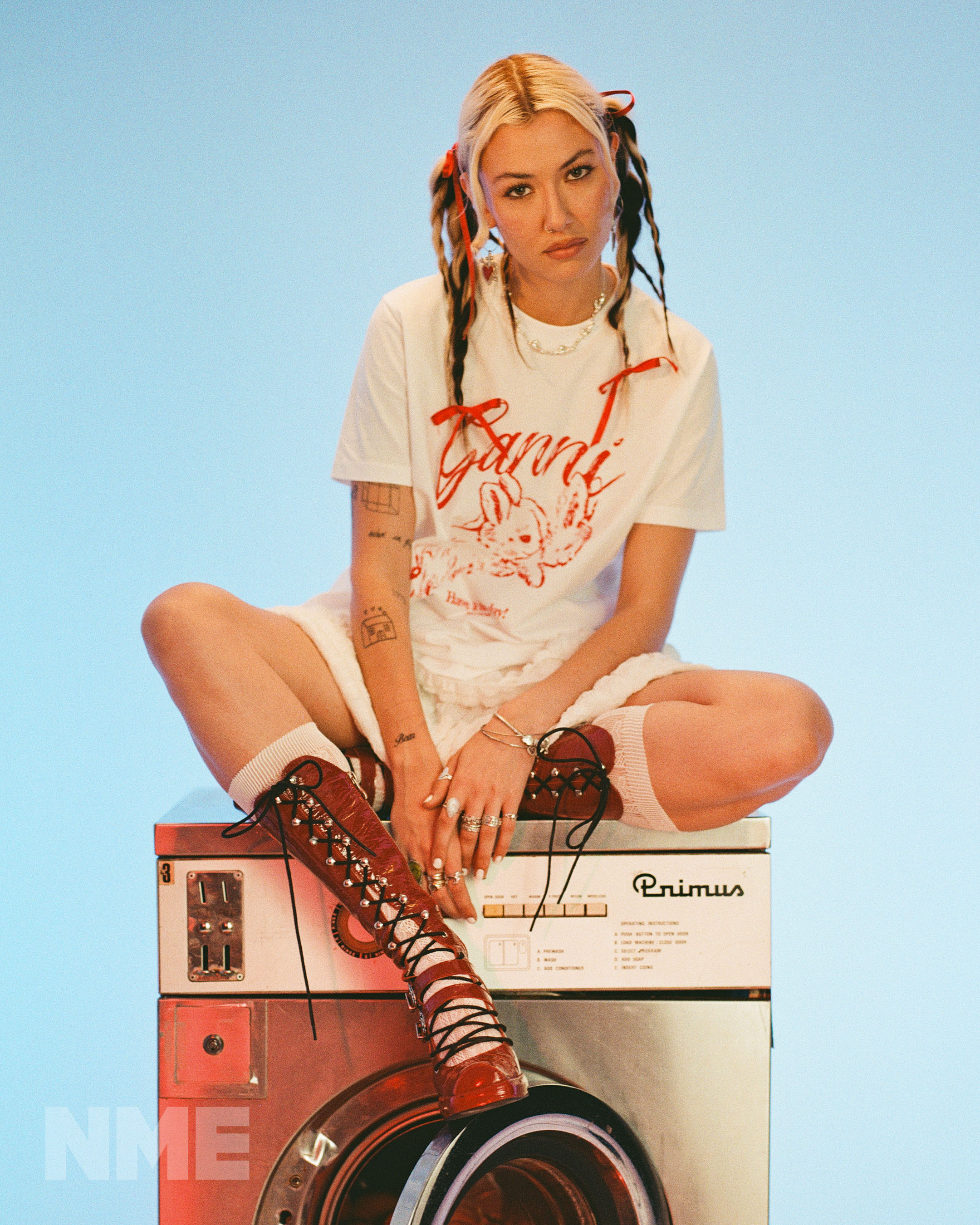
“I told him I didn’t want to and he was like ‘No. That is you. You look like that, so you need to do that’.” Uncomfortable, she gave in and hated the resulting song. “It completely destroyed me. I didn’t feel like a good writer.”
Since then, she’s been careful to confidently assert herself. “I feel for young women who are doing this on their own because it’s scary,” she admits. “But it does work out, and I’m so glad that I believed in myself and didn’t listen to those people’s opinions.”
This steadfast loyalty to her vision is paying off. When she performed at TRNSMT earlier this year, she saw an unexpected cohort in the crowd: lads. Awed, she tells NME that one even met her after the set to share the impact her songs had had on him. “I was like, ‘Oh my god, you’re an 18-year-old boy. I never thought you’d have any interest in my music!’” she laughs. “It feels great. They’re not just seeing me as a hot girl on stage. They’re actually inspired by my music.”
But Pickering is also experiencing the downsides of increased exposure. The TRNSMT set was one of the first of her performances to be filmed and uploaded to BBC social media pages. There, hoards of middle-aged commenters discussed not her performance nor musical ability but her outfit – a black lace bra worn on top of a white cropped T-shirt.
“I feel for young women who are doing this on their own because it’s scary”
“She looks terrible, she got dressed wrong. Does she not know how to wear a bra? Blah, blah,” she mimics them with an eye roll. “Actually,” she continues, “I find that it’s not even me playing music people have a problem with. It’s me playing guitar but also wearing outfits that are really girly and sexy.”
This blatant misogyny hasn’t deterred her, though. “There are so many women who have broken those boundaries,” she shrugs, referencing the iconic looks Gwen Stefani and Madonna created when they embraced their femininity. “It makes me more inspired to say: ‘No, I am going to shock you. I’m going to make you want to question what I’m wearing and what I sound like.”
Plus, there are people more important to Pickering than the ones moaning in Facebook comment sections. “The amount of girls that come up to me after the show and say, ‘I want to do that’ or ‘I’ve started learning guitar’ makes me feel so empowered.”
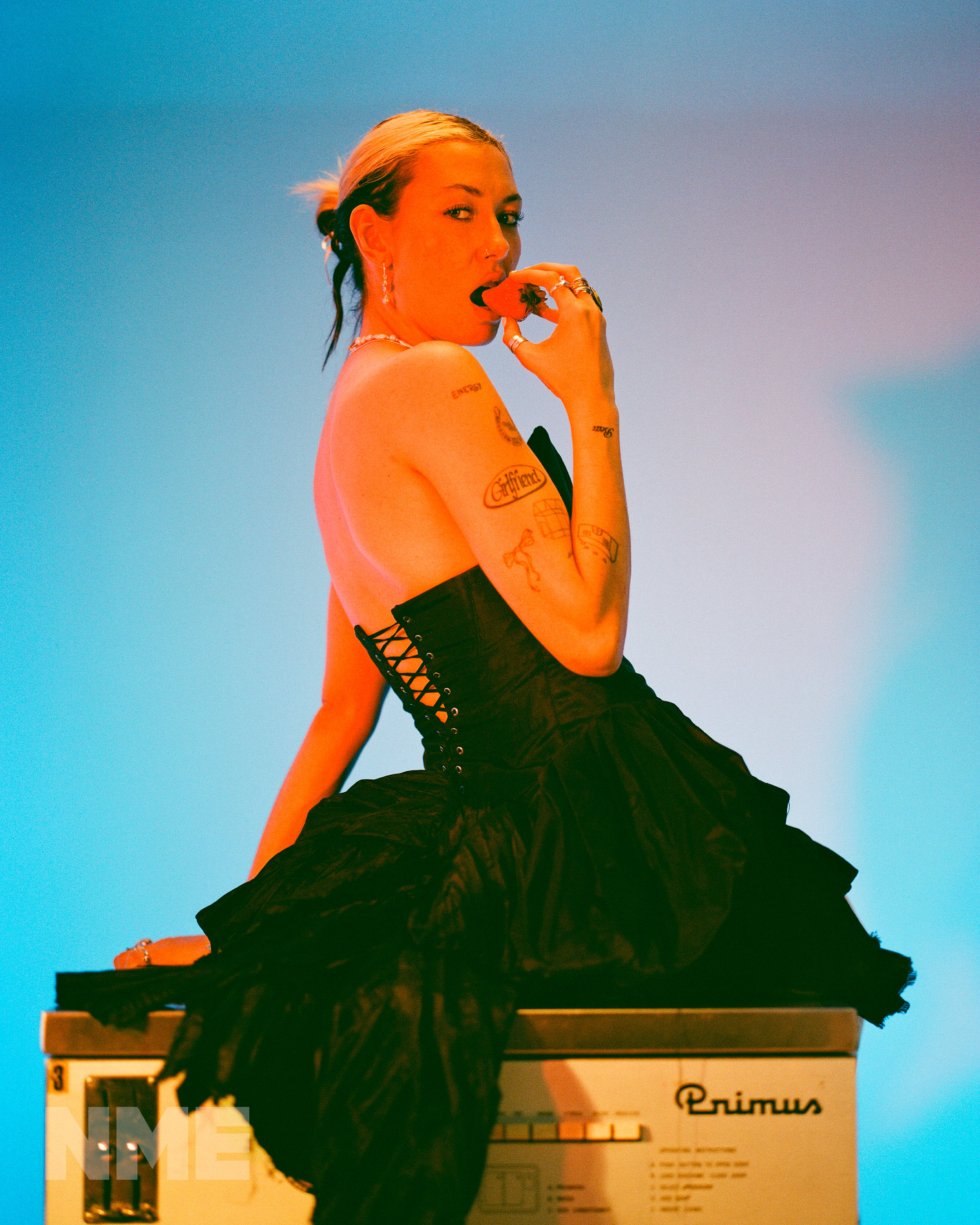
Pickering’s new EP ‘Watch It Ache and Bleed’, then, conjures this more confident, evolved version of herself. It’s been a period of transition in her life, between the acceleration of her career and the dissolution of the love outlined on her last EP ‘Lifetime of Wanting’. “A lot of the songs are me realising that my feelings matter and I have a voice,” she explains. “It’s me right now as just Nieve the person, not Nieve Ella the artist.
“I’m so different to what I was when I was writing those early songs about growing up and not fitting in. I feel like I got that all out of me. And today, I’m like, ‘Yeah, I am cool, and fun and hot and sexy’.”
She attributes much of this new outlook to the current dominance of female pop stars such as Charli XCX, Olivia Rodrigo and Chappell Roan. “There’s this whole vibe of girls just want to have fun, and we do!” Pickering exclaims. This inspiration is most prominent on her next single ‘Ganni Top’, a euphemistic pop-rock anthem defined by the mantra “she gets what she needs”.
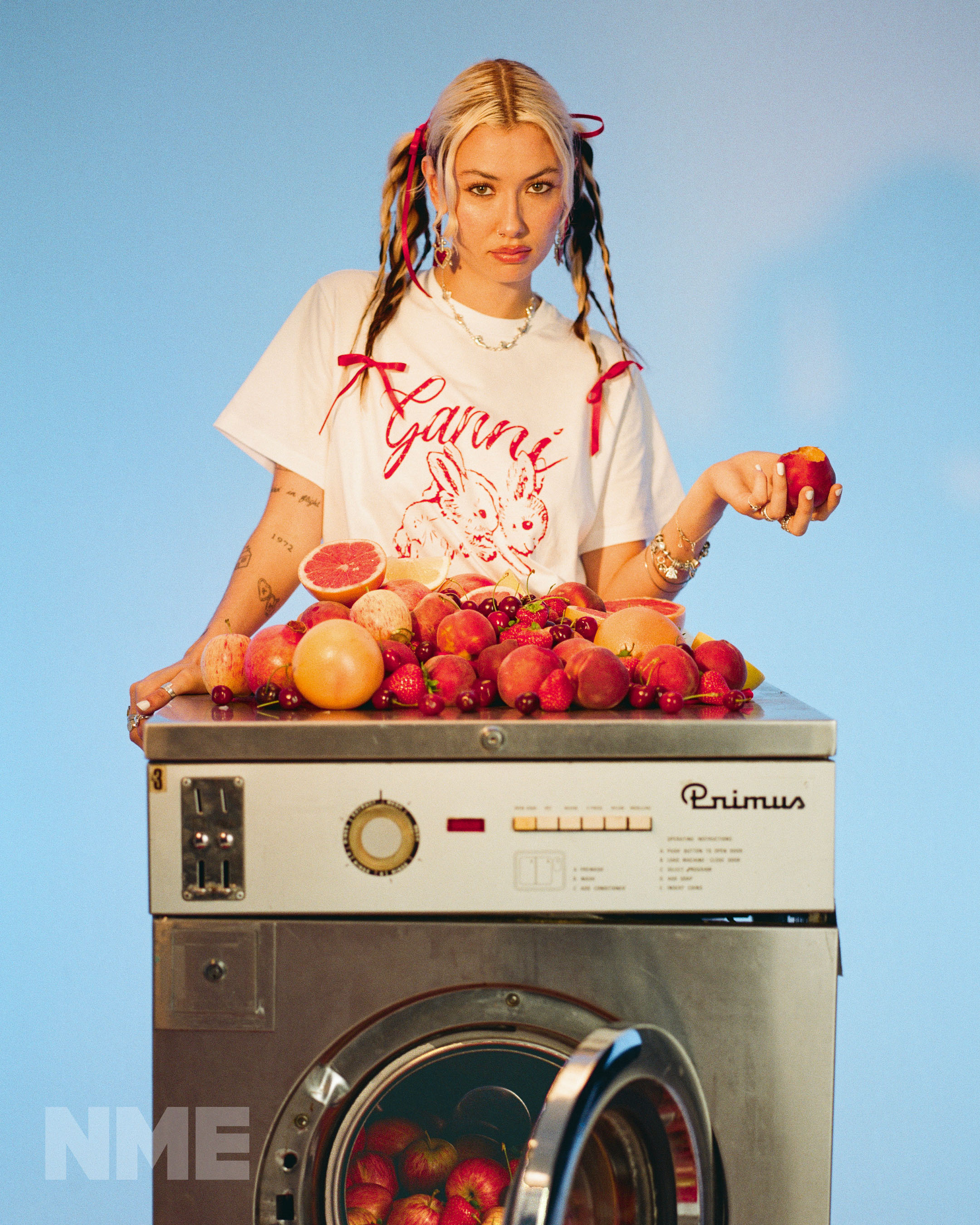
And, even when the themes are sombre, Pickering maintains the energy of her new conviction through fun, anthemic choruses and wittier lyricism. ‘Sugarcoated’ explores the pressures of being thrust into the spotlight – written during the tour with Inhaler that she says was “amazing, but overwhelming”. On ‘The Reason’, “one of my favourite songs I’ve ever written”, she contemplates the many factors that culminated in the collapse of her first love.
“I want people to say, ‘This is so relatable; this is exactly what I’m going through. That means I’m not alone. That’s always my thing: I want people to feel supported by my music.”
Whether she’s aware or not, these hopes are already realised. It’s evidenced in the plethora of fan-designed tattoos decorating her arms, visually laying out the story of her career so far. Among them is a homage to her debut single ‘Girlfriend’, the track that started it all. Now, she’s wondering what ink should represent the new music.
Pickering’s first EP opened with ‘19 in a Week’, which lamented the fear of life past teenagehood. Now, she’s ready to look ahead. Gazing at the memories etched permanently on her skin, she smiles. “I know when I grow old I can look back at these and think, this is what I did when I was young and making music.”
Nieve Ella’s single ‘Ganni Top’ is out soon. Her EP ‘Watch It Ache and Bleed’ is out October 17 via AWAL Recordings
Listen to Nieve Ella’s exclusive playlist to accompany The Cover below on Spotify and here on Apple Music
Words: Laura Molloy
Photography: Rachel Billings
Styling: Phoebe Butterworth, Maia Card-Gowers
Hair & Makeup: Chess Thornton
Label: AWAL Recordings
Location: Tileyard TYX
